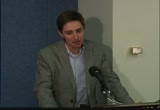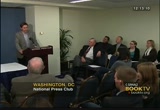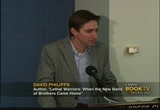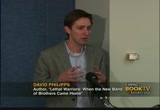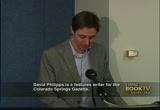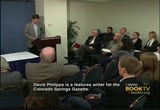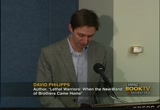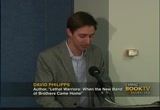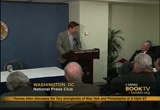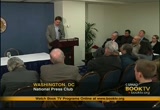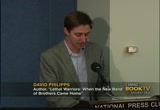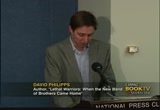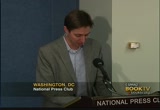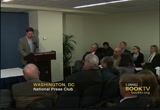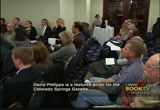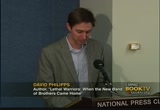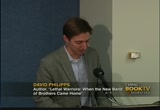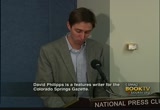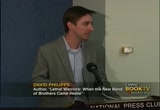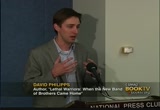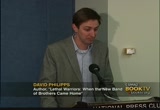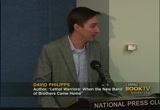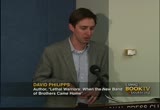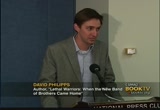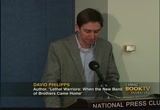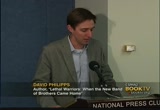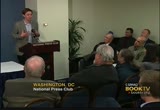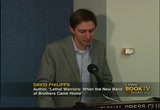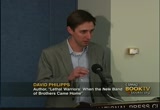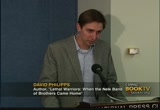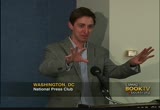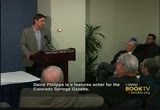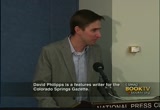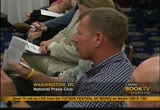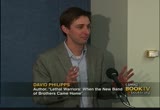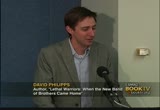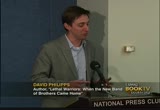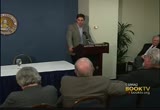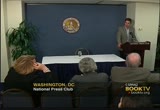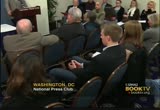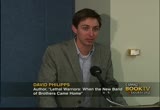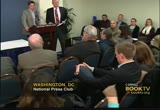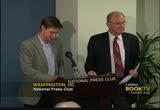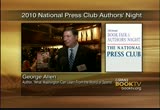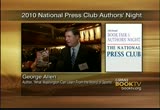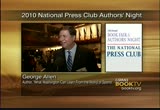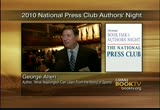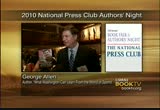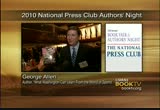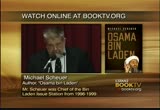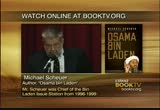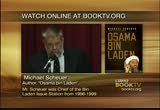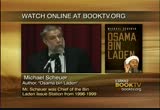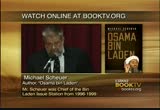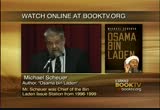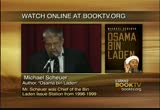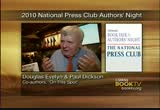tv Book TV CSPAN March 6, 2011 4:00pm-5:15pm EST
4:00 pm
>> coming up next, journalists david philipps talks about the fighter safe integer regiment with the deadliest fighting in iraq and the psychological damage that members sustained after completing multiple tours they are. mr. philipps spoke at the national press club here in washington. >> i'm here not to talk about an
4:01 pm
issue of the story of my hometown recently. i grew up in colorado springs outside of ft. carson published a large army base that had around 32,000. when i was growing up in the 80s and had a lot of friends doing military families they are getting deployed generally meant they be spending. it was not a bad gig when i was in colorado springs as and adult i started working for a newspaper in colorado springs and been deployed meant going to
4:02 pm
the sunni triangle to the sunni triangle to the sunni triangle pesch river valley, places that you send a fairly good chance of dying every day. it is not something that i ever knew about were it was my job to know about. my job at the newspaper had the sweetest gig in the world. they hired me and there was a job today in colorado. they hired me as their ski writer. and in the summary do things like mountain biking and climbing mountains. essentially my job was to write about how to enjoy yourself in the rocky mountains and people who do it particularly well, which was great. and then these murders started. fort carson had one murder and
4:03 pm
then another and another, strange murders. murders that were strange not in the way they happened, but because when you look for a reason, there is days of the reason for them to happen and they were beautifully reported as newspapers do, what happened and they were set up for a trail of the many months and they would report on whether the person were guilty or not guilty. they were always found not guilty. but with the newspaper telling a story. why was that happening? as a journalist you could ask a whole opposite spokespeople who are ready to tell you without saying very much about trying to explain what's going on. and they would say well, this is a big population and their like anybody else. you're going to have some bad apples in there were going to
4:04 pm
get travel. and that was their line for years. and so finally, i decided, who would really know about this? the soldiers who were there would know about it. many of them are just sitting in prison. maybe they'd be willing to talk. i brought this idea up to my editor and the editor said, you are the ski writer? go sit down. so this is something i started to do in my free time, talk to guys in prison, sitting down with them and talking for the whole afternoon, saying okay, let's start in high school. only when he joined up and lets end in prison and tell me what happened in between. and then os x, who also stay with you? who else could tell me about the same story? i started to just rebuild pieces of the platoon scattered over time come either guys who got
4:05 pm
arrested or kyser added the army and try to rebuild the story because i thought it was an important story both from a city and for the army and ultimately for all of us to learn what had happened with the soldiers at fort carson had created a string of murders. and i'm not talking a couple of murders. i'm talking about within this brigade. i learned after tracking down soldiers that it was one combat per brigade is that this is happening. within this brigade there was one battalion in almost all of them came out with about 500 soldiers. and if you calculated the murder rate, it wasn't one or two bad apples. it was about 100 times the national average. and if you adjusted it okay all young man -- they they are all gone and all males. that the highest risk in the population. it was just 20 times greater than not very high risk.
4:06 pm
is that we are talking a big problem. so i started to piece together what had happened. and i'm going to read you about them and tell you what happened to them because as they made sure to say when i was at the pentagon today, the army repeatedly cited as a learning organization. and a number of individuals for that is really true, people that know what is going on say you've got to fix this. that really has started to happen at fort carson to the point where the things i wrote about sort of the war experience and the integration failures, those things have turned her over for carson is like that unless i cannot help you people come to fort carson say wow things are really working.
4:07 pm
let's figure it out so we can spread army ways. so i'm going to tell you little of the story of this brigade. i'm going to refer just a few and to give you some background. all the guys that i'm talking about, almost all of them are 20 years old or all of them joined right of high school and were all immediately sent to korea, not iraq and they were expected to stay in korea for a couple of years. but this is back in 2003, early 2004. and all of a sudden they realize the iraq war was not going very well. and so these guys are suddenly called out to the worst part of iraq at the time. they were and what is called the sunni triangle rate between her body and falluja.
4:08 pm
so i'm just going to tell you i have a few vocab words here and i had to learn a whole language when talking to these guys. one of them come in to active duty is your who will know. i refer to something called a saw. it's essentially like a medium-sized machine gun that soldiers carry. i'm also going to refer to something as a four lane highway just like an interstate that connected ramani and baghdad and it was the battalion's job to do highway patrol there. but highway patrol there was so full of firefights and burned-out cars pushed the side of the road that they quickly renamed it operation madman
4:09 pm
after the 80s movie. they named all their operations after old 80s movies. so i'm going to read to you a particularly bad day on mad math and then i'm going to briefly explain kind of echoed throughout time. and excuse me for using and things i have in introducing characters. whenever you picture them come picture me 10 years ago because they are god, skinny guys. their helmets look too big for them. so don't picture rambo because he won't have the right image in your head. i'm taking you back to 2004 in the sunni triangle. by the end of the week when
4:10 pm
kenney eastridge learned his platoon was going back on three days of mad math, everybody was on edge. they have been trained early on to protect themselves from ambushes by watching for anything out of the ordinary. the problem was they soon also learned that almost everything in their corner of iraq was out of the ordinary. every day the soldiers struggle to find meaningful hands of what norma was in their patrol area and what norma was not. three people dressed head to toe in black robes, their faces covered except for loading ice. was that normal? 79 packed into a tiny taxi. was that normal? the burning mound of trash in the middle of a neighborhood with goes for a chain on the smoldering edges. was that normal? and some of the things that appeared most normal with the
4:11 pm
most deadly. a person on a cell phone, a boy on a bicycle, a lone driver in a car, a clear strip of highway. any of them could be a sign of an imminent bomb attack or not. there was no normal. the first few weeks here or there you have a fear that you are going to die any minute. david nash remembering his election. at some point you don't care anymore. you accept your fate and wake up in the morning and say yup, i feel it, this is the day i can't whacked. i'm going to pause here and say that the language that young infantrymen use is not necessarily the language i would choose to use at the national press club, but i want to be true to who these guys were. so i find it easier to read if i
4:12 pm
apologize in advance. several hours into the patrol, the two captains called on the radio. the battalion had a tip that a group of insurgents in a car packed with weapons was on its way from ramadi to falluja. he wanted to meet west of coffee a. the platoon walked down from a mosque they had raided the day before. they part their three humvees alongside of the highway around 1:00 p.m. and they had to block off all traffic coming out of ramadi. private josé barco she did a big code of razor wire off one of the humvees and begin streaming across the pavement. each took out a few feet away with the pixar. i decided to of the street, a few riddled houses.
4:13 pm
on the other side of a class or of shocks in the street. their owners during a soldiers to the dusty window. each his job was to watch over the platoon sergeant. while the sergeant directed the traffic, at the moment strickland was conferring with another leader, sergeant sean hughey about where to put an observation. the street was full of people and cars, women in long black in and out of the shops and a group of children played in the nearby deaths. if it wasn't normal, this is close to it. it was a sign that despite the previous days of violent, all was well. the platoon fanatics, specialist brand crab walked up and asked the platoon sergeant if he could smoke a cigarette.
4:14 pm
sergeant strickland supplied to the new soldiers were not allowed to smoke in public and the captain was they are he had to be stricter about the rules. he nodded his head towards the humvees 50 yards of the road with the captain had pulled out. the company commander with adamant soldiers were full of professionalism and respect to the civilians and not meant among other things no smoking. the platoon had been out for hours in the city really needed a smoke. go take this guy down the alley for a smoke. easter zen crab walked back the humvee parked at the mouth of a narrow alley and what several paces down the corridor to sit on the toppled wall. on the wavelength of michigan, josé barco pulled the way across the hot pavement. other soldiers stood with their
4:15 pm
hands resting on the rifle. a group of iraqi men who had been in an intense conversation on the far side of the road while type two barco and asked them to move the humvees blocking the alley so the locals could get to their houses. platoon sergeants at the iraqis and looked at the humvee and then he told them they could go around. the truck wasn't moving. they went across the highway arguing in arabic. hey barco, can i bury her clothes? he turned his head to answer. it was the last thing he remembers. at that moment a suicide bomber veered across the median, aimed at the humvees blocking the alley and released his detonation trigger. instantly a flash of heat and concussion shattered the shop window. soldier assaulted before they heard it as the shockwave put
4:16 pm
into the ground, glass and metal everywhere. the force ripple that the alley and hurled them into the dirt. they were hit so hard that first pic that someone had tossed a grenade on their head. everyone late days with the fog. it lasted only a second or two. are you okay? eastridge said the medic as he pulled himself up to his knees. yeah, yeah, i am okay. are you? he scanned eastridge bourbons and cleans up over his head to a huge, thick cloud of black smoke over the stream. eastridge whipped around and saw the oily smoke. he grabbed him by the shoulder and they sprinted down the alley into the clouds. confusion hung as thick as the
4:17 pm
smoke, the army's combat medic training and drill tools needed, but nothing prepared him for what he saw. he follett easter just a squeeze past the mingled burning wreck of the humvees are the suicide bomber's car was nowhere to be seen. the class had destroyed almost completely as crass and easterners went into the street, tiny pieces of metal out of town silhouettes of bodies materialized in the haze, some moving, some not. an iraqi woman appears to the cliff, weeping as she tried to drag two children out of the road, the link on the ragged bodies have been coming to pieces and left on the asphalt in and the sickening slick oil, fuel and blood. crabs went past the women come straight priorities of combat
4:18 pm
medics mandated that his soldiers always come first. dramatic direction, members of the platoon -- towards this type of william civilians stumbled away. crass and eastridge found their platoon sergeants, strickland commingling for soldiers to get their rifles at the ready for another attack. the sergeant sat on the ground with his hands raised in the air. it looked like several of his fingers hot only by strips of skin. blood streamed out of his mouth, shop dell had torn open his cats living ribbons of red muscle, spreading blotches on his uniform showed where shards of the now obliterated card had shot into his body. all army medics are trained to divide casualties into three simple categories as though they are going to make it no matter what they do. they are not going to make it no
4:19 pm
matter what you do and those who may make it or may not depending what you do at that moment. medics are told to ignore the first two categories and focus on the last. bloody or not, strickland was going to live, at least for now. the medic told the nearby soldier to get the sergeants and working in bandages and pushed on. krebs passed another soldier whose she can then open by shrapnel and hunt down revealing a bloody jaw and teeth bared a shard of metal was stuck in his jawbone. he too was going to make it. crabs kept going to another soldier who was waiting for missed space and yelling, i can't see. he was going to make it. then i curled -- hurried towards the captain and some other soldiers have obscured by smoke were wrestling blistering hot razor wire off of the tangle of soldiers. crabs took a half step towards
4:20 pm
john q. you had been standing crumpled to the ground. the medic hurried over and knelt down. he saw blood squirting from the soldiers left thigh. he was paperwhite and gulping air like a child. a chunk of card punched or both sides may blow the pelvis, clipping both female arteries. blood was coming out in a spreading pool on the ground. if he didn't get care right now, he was going to die. this is what krebs had trained for. krebs applied pressure to stop the bleeding much his whole hand sink into the wound. he tried again. kiwis bleating for shallower and he yells for nearby shoulder. specialist josh cutler said, help, help, i need you to breathe while a whole pressure. easter stood near them, glaring
4:21 pm
down at group michigan. he was waiting for the rest of the ambush. a thorough passed over transfix and butler working on his favorite sergeant tessera chart a rocket iraqis in the road and and a pastor with the smoking wreckage were a soldier was yelling, they are burning, the burning. help me, they are burning. in the wreckage, he fell on his friend josé barco. the cuban kids from miami with the flaming front end of the suicide car. eastridge watched barco keep away the wreckage. the private tent stood up, wobbling in shock, blood soaking into his uniform for 100 jagged bits of car that hit him like a shock of glass. to his amazement, he heard them start yelling i'll kill them. give me my weapon and i'll kill them. how the visiting arm is still on
4:22 pm
fire. other soldiers frantically padded out the flames and made the smoking private on a stretcher. he could not the burning flesh. krebs and butler put kiwi into the net that track is the just arrived. sergeant strickland with his mangled hand is stacked right below him. just before they pulled away, the captain put kiwis limp hand. tom is going to make it. they drove off to the hospital. eastridge kept his hand leveled, gathering to collect a debt. little scraps of flesh that had once been a suicide bombing outfitters the road. a couple of platoons from alpha company arrived in front of so have to control the crowd.
4:23 pm
eastridge watched as his captain walked into the dirt of the highway, oblivious to the danger and kneeled by a limp body. it was an iraqi boy who looked to be about six. a pool of blood surrounded his body in the whole right side of his head was masten like a flat basketball. the captain search for polls. sir, he's dead. the soldier next to the captain said. i felt him take his last breath. the captain looked at the ground and started to weep. when he stood up, he told his fair chance that no one in the platoon was leaving until after sundown. they were going to guard the chunks of the suicide bombers oddie now falling all over the block. in the muslim faith, the captain said, a person who must be buried before sundown to go to heaven. he suspected the friends of the suicide holmer were waiting to bury their latest marker in the
4:24 pm
unit was not going to let that happen. they stayed for hours, guarding the gruesome scene. a few locals try to collect pieces of the suicide bomber's body and buckets. the soldiers raised rifles and rocket tend to dump their buckets on the asphalt. i am going to skip a few paragraphs and just say that sergeant huey and strickland and barco were taken to the hospital huey and barco lived or been sacked to the, but the squad leader and father figure for all of the guys that i've mentioned that they are. i am going to join up where kenneth eastridge has gotten the news that the squad leader has died. as the sun went down, eastridge tried to keep himself squared away. he was guarding the same alley with the blast had not into the
4:25 pm
dirt. now in the failing light, a finely in the narrow passage between the wall. no flash, no ribs, no explanation, just a human spine. eastridge's battalion has spent months repairing for iraq and here they were, totally unprepared. he was trained to shoot any then in an attack that would be several soldiers until demand whom he counted on most, but he had not been able to fire a shot in defense. can't promise useless on the root michigan. all the training to outshoot, outmaneuver and outthink enemy soldiers proved futile because the enemy in iraq was not a soldier. he was a shadow. , a disease that walked invisibly through the civilian population. it made eastridge various. the locals left scumbags hiding
4:26 pm
their mates. he was enraged that killed sergeant huey, his mentor, his later, the one he looked to for answers. and now sergeant strickland, the platoon leader was out of the picture too. these statements after their tour in iraq, eastridge thought to himself. who would've played the platoon? for what they do? he put his hand down on the crumbled wall to steady himself and felt something warm and wet in his palm he had leaned into a piece of lung or liver or something. he didn't know why. god, and he his hand away and sneer down the wall. this is not what he had signed up for. he felt even fainter. he went to steady himself and put his hand right back in the litter.
4:27 pm
so this is a story that continues very old mother to her that's actually worse than the first four. at this point, most of the guys did i mention decided to a year to a very old infantry credo that is not as far as i know any part of official army education and that is do unto others before they do unto you. they were in an impossible situation, fighting against an enemy that was very often unarmed. and so comes the rules of engagement did not allow them often to engage. and these guys, you guys, guys who are most interested in protecting themselves and their friends. by the second tour, often killing unarmed people implanting them on them were through various tricks, making
4:28 pm
the command believed they had been attacked so they could respond and they probably killed a lot of people unnecessarily. i don't equivalent for know how many. but i wanted to review the passage so you can get a sense of how that feeling and that response might develop. and what i'm going to do is just tell you how each of these guys i mentioned and that. i don't know if there's any pricing here tonight. any? raise your hand. none in the national press club. one of the failings in the iraqi war as we been really good at inventing. we've been good at training detailed accounts of major military acts, such as the assault on falluja. we've been really bad at telling the whole story, which is that
4:29 pm
our military forces are going back and forth and back and forth all the time and the stress that puts on them, living in two rows of what happens when they are back here and how do you live in this duality? i don't think we talk about that much. and this is something these people and their families lives. so i will start with one of the good ones. sergeant strickland, the platoon sergeant who had his hands and ankles was walter reid. he was patched up in the seven-time to going to play with the unit that can in 2006, where he was blown up again in baghdad once again he healed well and was medically retired and is doing quite well. merry, out of the army. but everyone else was so lucky.
4:30 pm
ryan krebs, the medic obviously was released i think you can imagine had a lot of shame and guilt not been able to save everyone that he laid his hands on. he started abusing drugs, mostly and alcohol when he got back to the united states. it was under the radar enough that you eight and a year later was elected to play with the battalion. but by then, he was so troubled by his war experience that he essentially became suicidal and stop putting this back then. they were assigned to a very, very violent place in baghdad where they saw contact every day. so not loading your weapon is a deliberate act. he did that post because he wanted no more to do with this type of killing him because he hope to some extent he would be killed. it didn't happen. he came home and he was reassigned out of the battalion
4:31 pm
to a job in the clinic and was eventually medically retired for ptsd. shortly after he retired, he overdosed on some of the drugs that he was getting for his behavioral health issues in the suicide attempts, but he did not die and is actually doing very well now. he lives in denver. he has a wife and a child and is on the g.i. bill, going back to school. so he is in a much better place than he was and became an instrumental person in the hoping to tell the story. josé barco, the fellow pinned by the burning car was flown back to the united states to the burn center. he had to get skin grafts and get patched up and is in the burn center for several, but then went back to his unit where
4:32 pm
he was supposed to be medically retired, but because everybody in the unit placed him and he really wanted to go, you sort of snuck its way back into the next appointment, where he became one of the people i describe who felt he was justified in shooting people, primarily people under thoughts, which he felt were working with the insurgents. he called the watchers and many of them may well have been, you know, they would alert insurgents to where americans so you would do things like that. he made it unscathed through the whole second tour despite two close calls with ieds. when he got back, he was sort of a classic case of posttraumatic
4:33 pm
stress. you know, he avoided going to places of democrats. he carried a gun all of the time because of paranoid that someone is going to attack him. would have been a survival instinct and a very useful one and back out without liability. he was drinking and he had a rage to him and it quickly led to him getting divorced and a few months after the deployment, getting into fights at a party where they threw them out for essentially getting drunk and of noxious. when this happens a party, i brought it to the front door goes up the front door onto the lawn to watch them leave. and he got in his car and emptied his whole clip of his pistol at the crowd, only shooting one person who was a pregnant woman. she was seven months pregnant. he was charged with attempted murder. she did not die, but she was
4:34 pm
pregnant so two counts and got 52 years. the judge called him a disgrace. josh butler who played a very small part in the scene was a guy who gave mouth-to-mouth to the sergeant had died. the sergeant had been his father figure. like krebs got me started abusing drugs and alcohol when he got home. he couldn't read the thought of going on another tour, but who signed up for a tour. so he got josé barco to shoot him. he shut them and i like be medically retired. he only missed a few days and they put them back in. he eventually was kicked out for using. he too was having a lot of the classic symptoms associated with posttraumatic stress and got in a lot of physical fights of his
4:35 pm
life, eventually when the bad enough that it sent him to prison and she was pregnant at the time and had a miscarriage a short timeout chair that he blames himself for. he thought if he hadn't been in the in the sites of care, child would've lived. he is now out of presenting, but lives a very marginal existence. he is then in an out of unemployment and lives in a motorhome. and that just leaves kenneth eastridge. he came back with the same sense as if a lot of these guysand was arrested after the tour for pointing a gun in this reference pays. he built himself out of jail and rather than awaiting trial, which is what he was supposed to do, he deployed with the rest of the unit back to iraq, where he continued to spiral downhill.
4:36 pm
he was one of the do unto others before they do unto you people. he has lost any faith in the people that they were assigned to protect. he told me that he and others would rob houses that they were supposed to be searching. they would stockpile weapons, which they would then sell back to rival factions and use them to guide using drugs. they would also sometimes outrageous and then set up gordon which two people. this is based on stories from the platoon. the army investigated that after the colorado springs officially have never found any in about it, but i think some of it has happened. anyway, at some point he was so unstable in iraq that they put
4:37 pm
him on duty guarding the fog, the operating base and there he was caught with valium, which is available across the counter in iraq and he was court-martialed. they essentially decided he was to that of a soldier and too dangerous to keep in iraq, so they sent it back to colorado springs and they did this repeatedly with guys from this brigade. but the guy from colorado springs sky makes a very worried that of someone as to what able to stay in baghdad, you send them to us. and that's actually a good move if you have a robust behavioral health system in a good or detachment at the brigade that can keep track of these guys. neither of those would be placed in colorado springs. frankly, we still had a behavioral health, often at fort
4:38 pm
carson was the size it up in when no one was seeing their friends grow had increased 700%t was overwhelmed. if he fell through the cracks in the cracks of this date, no one would come looking for you. and so they medicated themselves instead with drugs and alcohol. they gravitated towards guys who were in a similar boat. so eastridge was finally arrested because he had been running around with two other soldiers from his company would also been sent back for similar reasons and they were finally arrested for two counts of first-degree murder, both for killing other soldiers from fort carson, at least one count of armed robbery and a bizarre crime in which they ran over a woman they didn't know and one
4:39 pm
of the soldiers young medics jumped out and stabbed her several times before leaving her for dead. these are random, random crimes and is a terrible story accept, and this is very important, except that it got so bad that the army as a whole and key people at fort carson in particular said we've got to do something. the keepers and there was a general, the general in charge of all of four-person for carson. he had this unique way to look at things his name is general bart graham. he still an army, no longer at fort carson. a lifelong soldier. his sons grew up moving around like army brass and a tumor to officers. by the time he took over for carson, both of them were dead.
4:40 pm
one had been blown up just a few meters from the scene i described to you in the book in the sunni triangle and had killed himself after struggling with depression and being afraid to openly treat it because you as an officer in the army and especially at that time into an extent still that just didn't fly. his family come up launch to horror of war, to the behavioral health. he had nothing to lose. he had only to gain because he felt like every day when he looked at those soldiers, all of the soldiers he saw his son who said, what would they do for these guys? and no, he top to bottom remade behavioral health, how the command deals with the
4:41 pm
prohealth. not only that come he got the army to commission a big city event at the genealogical consultation that brought in all sorts of scientists to look at what was going wrong. what was the work in an hockley fixate? this seems i cannot be a thing to do, but the army doesn't obviously do that because if you are the general in charge and you do that, you know that what they are going to find is going to be bad and you're going to have to stand it when it is with all these press people out there and talk about the murders and what we did wrong and no one who wants to move up the chain of command would do that. tonight think it's this deep inherent that it doesn't matter. this is something we have to do. and so now, things are remarkably different for carson. i'm not going to say that war doesn't still have the ability to ruin people. i'm not going to say they are no
4:42 pm
problems. but if you look at the brigade from afghanistan, just as bad of a fight if they had in iraq last time. the last dirty men. but the numbers are very different but the numbers are very different but the numbers are very different number of people who very different good number of people who are attempting suicide for doing something all so crazy they are put in a mental hospital is down about 70%. at the same time, the number of people who are getting biweekly treatment where they are talking to a therapist may be going to get antidepressants is way up. they are breaking down state funds that people are getting intervention earlier. they are never getting to the point of are really getting to the point of having to go to the hospital and murders are also
4:43 pm
way, way down. this is very important, whether you are a huge supporter of what we're doing in iraq or afghanistan or not. this is an issue that i think anyone can agree we need to make progress on and for shelley that is really starting to happen. but it depends on continued vigilance. i write a little bit about the other steps they are taking in the book, but i think i'm going to stop there so i don't rent to live and open us up to any kinds of questions. i know it's got a couple active duty folks and hopefully some vets. [inaudible] >> -- ever since we've been at war and the second world war? is there something we have identified? >> esl and ptsd has been around. were you named --
4:44 pm
[inaudible] >> yeah, i mean, i think everybody in the room probably have some sense that is true, but it's also different. i mean, you ptsd has been around -- our brains have not changed for a long time, essentially since he got hold of a really good source of protein, our brains have a change. but something has changed, which site ptsd more often now that maybe we did right after vietnam. after world war ii and that is worth war is fundamentally changed. in world war ii if you are wounded and my grandfather was in world war ii world war ii, you only had one in three chance of making it out alive. by my father's generation in vietnam, if you are wounded,
4:45 pm
it'd gotten slightly better, but not much. one in four chance you're going to live from your wound. now, it has improved so vastly that the last numbers i saw were one and 20 and it may actually be a lot better than not. and not only that, but because of body armor and armored humvees, their people are never officially injured in the first phase. and so we have many more people who have seen combat and are walking amongst us seemingly without a scratch. they may have added several ieds and several firefights. they may have even been shot and not have a scar. and yet, the human psyche does not change. and so, you can understand we still have to carry all the burdens. there are just more of us around. yes, please.
4:46 pm
>> i am active duty. it's an interesting phenomenon that you compare this war and other wars. i can be a fire fight at home within 18 to 24 hours. it's compared to previous conquests, in particular world war ii, when my uncles came back on a ship that was three weeks, were deep depression occurred and they got to san francisco and after ug is very comparable to what we are seeing today. you could pack in san francisco and made it across the country to their wives and families. there is that. decompression. is that a factor at all if you look to the soldiers that that might have helped in this case are not? >> i guess my short answer is i don't know. but it is interesting that the things that every brigade that
4:47 pm
deploys to iraq and afghanistan now has it they call combat tells her combat stress and what they'll do a lot of times is they'll have a debriefing where they have everybody go around and talk about what happened and it's actually really helpful thing for people because it creates a narrative and sort of helps your brain on the conscious and the subconscious level sorted digest is stress, define it. and it's not funny that's what they were doing on the ship so without the combat stress team? and when it is a case about this, and i said, what could you do differently? what could be re: do differently? and these are young guys who are now in prison after getting to the rank of specialist. they all seem to articulate that would be a good thing, that for a period of a week or two have
4:48 pm
some sort of decompressing. it is tough because on the other hand you wouldn't give up your 10 days of r&r coming to 14 days of r&r where you are there with your family and then go back. so it is a tough line to walk between keeping people away from their families and trying to give them some structure. but i agree. i think more good leaders are starting to sort of build those debriefing, de-stressing time into their return. >> anyone else please? >> is there more effective treatment of ptsd? >> okay, first let me do a big disclaimer. we usually do you ptsd to mean anything that's wrong with johnny when he came back home from work. he came back different. ptsd is really specific.
4:49 pm
it is essentially a memory dysfunction, where you are unable to surprise or you are avoiding reminders of a dramatic memory and is causing bad things to happen in your life. that has a lot of really promising treatment at all involved exposure to in some ways that germanic event where there is talking about it or writing about it or even going to the military now has essentially a virtual reality go through the streets of iraq types of things. i will help you dead in your abnormal wrist onto the memory. but there are different things obviously that are more complex than that. and when johnny comes some different, it's not just that he hides under the bed when he hears a loud noise. shame, guilt, depression.
4:50 pm
i'm trying to describe it this way. we assume almost everybody in this room at college. to give yourself the day that you got their freshman year and what a fool you were so innocent and think about the formative experiences where you learn, make mistakes, met new friends, you grew and think about how different you were. and then replace all of that with iraq because that's what happened with these guys. they may be killed people but they don't think of them looked back on it they should've killed and you have to live with that stuff. it is being said we are also human beings are resilient and we can deal with us. we can even remake our character
4:51 pm
after we feel that it's destroyed. the key to success there are one of the most basic keys is that there's got to be a stable place to rebuild from and if these guys are hanging out that the guys who are all screwed up from the war, drinking and carrying weapons, they'll never have the chance. and so it is a command issue more than a therapeutic issue. how do you create an environment for success? >> of films that have come out in the last couple of years with our current wars, how if you reacted to them? and events you really thought were very strongly accurate and honest in portraying what you understood underresearched and knowledge? i'm wondering about your reaction, but they also put in
4:52 pm
documentaries. >> you know, i'll tell you that i'm sure the act of duty guys in here can yell out. her locker was ridiculous. you know, those guys and then all of a sudden he's a sniper. but what i found, just judging on the guys i knew on the surge in baghdad and a small group of guys that i've spent a lot, they did not show -- they did not necessarily value iraqi lives in the way that the hurt locker for trade iraqi lives. i don't think they necessarily would have risked much. they would've raced anything for their unit, but if they thought that one or two iraqis could have been blown up in a blast that they didn't do something, but they might've gotten blown up, that is just these guys.
4:53 pm
the one that i thought was most like the guys that i wrote about, the movie that no one ever saw, in the belly of the law. and in it, it turns out to one of the soldiers had been killed by three other soldiers and there was a reason for it really. you're the question. >> did the army general call you to discuss your findings in your boat or does he speak to any of the units coming back or deploying from the fourth division? >> i am not allowed on fort carson. i had to get permission to people following me around with a tape recorder. [inaudible] >> vsnl. and the military you can't generalize. some people are complete and there are other people who are
4:54 pm
intelligent and thoughtful and open-minded and i have a lot of friends at fort carson. they are just not the people who would necessarily be in charge of dealing with the media. but they are very open-minded. in fact, the other day i had lunch with the brigade psychologist and she's doing fantastic work. [inaudible] >> -- almost his life or to make sure as many people as possible understand why it is that in this war and how it can be treated. do you understand the impacts on family and brigade leaders? chaplains are becoming more involved in advisory roles to use, commanders and finding hegemony cricket ingredient before some of the stuff is even a devout. i appreciate very much what you
4:55 pm
have done for this whole realm of misunderstanding. i feel very badly for the guys who are still over there. >> all plants get thrown out the window for novice and unique guys -- like there are rules in the book the day you need two years at home and at most a year abroad and these guys had one year at home and 15 none in a really bad place and a lot of them didn't get to take vacation, their two-week leave because they were too short of bodies. this war was supposed to end eight years ago. so, i take all of that with a grain of salt, but at least they are saying good things. >> have a ticket away from the feature aspect and the individual to the larger picture of the cost of ptsd and the continued treatment of it.
4:56 pm
i understand that a gentleman, for example, who was put in prison for honor is murdering scum of the woman pregnant. all rights, my brother is a judge. he has had situation where he ruined veterans. they go to prison for whatever it is they've done this time. once in prison, they no longer get benefits. so he has had a person who was escorted to the va to meet with his physician, who was taken and escorted by military police off of va grounds because he was now the state prison system's responsibility, thank you very much. so these people are not getting continually care for their whole repertory of illnesses and injuries and the cost is being
4:57 pm
dumped on this date in addition to that. >> right, we end up paying for it in one way or another. so who pays for the woman who was injured? who pays for the ongoing treatment, you know, what is the implication for all that and how is that changing? in minnesota, for example, where i am from, setting up a separate court system to treat veterans. it amazes me that this effort equal court system. >> in virginia we just passed a constitutional amendment exempting veterans from paying property tax who are disabled. >> you know, the cost will be
4:58 pm
with us for as long, long -- we are still paying for vietnam in a big way. one of the good things that come out of it though is things got so bad at fort carson and other places who loved in 2006, 2007 allowed an insane amount of money to be sent on ptsd and dramatic brain injury research, which went for universities all over the country, the potential like leap in science that we get is all of a sudden there's to be a really good thing. so i agree, there is a morass here that we have created. but there are early signs of progress. >> and anna toda psycho dad.
4:59 pm
i was at the airport transferring planes two years ago. the person checking me and said how many banks do not? i said to you. she said i can count three. i said okay, put it in. so i moved this site to put it in. she said note here, right now. all right, gentlemen behind me said honey, i'm not carrying anything. i'll carry that for you, sweetheart. so we started chatting. it turns out he was going to trestle city because he is a consultant for the pentagon and these from colorado springs. so i sat colorado springs, are you people just terrified out there because of all this murderous? he said murderous? by whatever do you mean? i said you know, all those murders, all those people coming home from iraq and shooting people. and he said no, those are just those guys on the other side of town. now however do you find out about that?
5:00 pm
and i said, internet. >> well, they do live on the other side of town. >> were going to have to call it a wonderful night. [inaudible] >> -- a very well done documentary. and if you want to see or comment on today's environment. >> the brigade that took over wrote about it. >> thank you very much. >> this is an appreciation of your being here tonight. ..
5:01 pm
equal opportunity which is what our country was built on. you would never have this see the need to see the washington operates redistributing from the winter's to those who are not winners. if it were up to washington they would take one of the steelers' super bowl trophies and say these detroit lions and they
5:02 pm
never made it to a super bowl. you have to earn it in sports. there is accountability and personal responsibility. there's measurement who's winning and losing, and there's also in sports a competitiveness that you are always looking at how you can improve yourself and make your team better and for team america we need to be looking at what our economic policies, tax policies, energy, education policies which are mostly state, not federal, but what can we do to make sure everyone in america has that opportunity to compete and succeed, and i have a chapter in the book that we've been on the first down since the 1970's. those sports teams love to say we are number one, we are number one. well america is number one when it comes to energy resources things to our plentiful coal as
5:03 pm
well as gas and oil resources but the leaders in washington will get these resources as a curse. any other country would consider them a blessing so we need to unleash our resources and the resources of our creative people rather than continue to get jerked around by dictators, oligarchs and the cartel's. >> is the competition getting fierce between the team republican and team democrat? >> it has been the that's decided by the people. the fans decide who has the best idea. the fans get the vote depending on what the office is every two years, four years or maybe six years and they were not happy with what's going on in washington. who has been cheering about anything coming out of washington the last several years other than strasbourg who was a pitcher with the national baseball team there hasn't been much to cheer about but people of their high school, their college teams so the people said we want to change.
5:04 pm
they see that what is going on in washington by any measurement whether it is debt or the lack of jobs, but policies in washington with her it is bailout under president bush or the health care monstrosity or stimulus spending that doesn't create jobs or counterproductive energy policy none of that is working so the voters, the people, the fans, the ticket holders to speak, the owners of the government said we want to change and they made that change and of those elected the number one thing to do is keep their promises, keep their promises they made to the people and start getting our country back in the right direction. >> do you miss being in their reena? >> i do from time to time. we've been involved in the governor's race last year and hoping of congressional candidates from the southwest virginia to the beach and the
5:05 pm
south side in northern virginia so we are involved and plenty of people have encouraged me to get back into it and we will consider that, but i'm trying to find a fresh or unique way of sharing ideas that make good sense that they understand that will mature team america is in a better position to be spending so that everyone has an opportunity to achieve their american dream. >> former congressman j.c. watts and the former l.a. rams deacon jones. >> he played with the redskins. my brother and i call them my older brother begin. the first one after roman gabriel, and my oldest daughter's favorite speaker and
5:06 pm
so there's a lot of good stories and there. ronald reagan, who got me interested in politics because as governor he would come to the football practice and said he is a politician who knows and then he asked me to be the chairman of the young virginians for reagan in 1976 and that's what got me involved in politics, and ronald reagan became governor the first year we moved out to california and my father was coaching, so there's a lot of good fun stories in their whether you're a baseball, football, hockey or even a nascar fans. >> the author of what washington can learn from the world of sports. booktv covered a previous event with governor allen, senator ellen if you go to booktv.org you can watch the full event in its entirety. >> let me first say i view saudi arabia and its arab pence of the
5:07 pm
tyrannies as the nation's state that is perhaps the most dangerous to the united states and the west generally. yes, russia and china are threats to the united states. but they are threats of washington openly acknowledges, closely watches and assesses and is fully capable of defending america against. saudi arabia however is a serious threat, indeed, one more dangerous than iraq. torch the governing elite in both parties turns a blind eye. our elite deceitfully pretends that it is a close and reliable ally. it keeps america's energy security dependent on its enemies by relying on the saudis to play a pro u.s. role in the oil market and in gingers the economy by allowing them to buy an ever larger share of our ever more out of control federal debt. in addition, the saudis over the past 30 years have built a
5:08 pm
highly effective lobby in the united states which is as pernicious, effective and corrupting as high tech but more quiet and subtle. the lobby employs former u.s. ambassadors, generals and seniors intelligence officers to argue the case in the white house, the congress and the media. and especially in the "wall street journal." and needless to say, the lobby's work is enthusiastically assisted by our oil and arms leading corporations whose concerns have less to do with the u.s. security than making sure they keep their seats on the saudi retrain that is even now hauling away another $60 billion worth of u.s.-made arms. due to these factors, the u.s. leaders never tell americans the truth about the kingdom, which is that since the 1970's oil boom started an enormous transfer of western wealth to the peninsula the saudis have quietly exported the brand sunni islam that has radicalized much
5:09 pm
of the historical defined sunni middle east region and which is now it of muslim populations in places like indonesia, malaysia, pakistan, afghanistan, india, the balkans, the north caucasus and sub-saharan africa. last year in nigeria for example saudi and gulf missionaries have labored and spent large sums of money and islamist group amended their to for the local agenda to name the united states as its number one target for, quote on quote, america's oppression and aggression against muslim nations particularly in iraq and afghanistan and because of its blind support for israel. more immediately dangerous for the west, however, are the saudi regime funded activities of its surrogate islamist clinics in the united states and europe especially in the united
5:10 pm
kingdom. for more than 30 years, the saudis domestic religious establishment which controlled education, social policy and missionary work has brought western muslims to the kingdom for theological training of its religious universities. these might return to the west to preach what can be described as a martial oriented islamist imperialism. a vision of the world as wholley islamic which for the west would mean christian and jewish populations could convert, accept subordination to islam or face elimination. the saudi preachers are prominent in the mosques in the united states and europe and have secured positions as chaplains in western universities, prison systems and the military's. this is not to say, let me stress, that all american or european muslim communities share this expansionist orientation. but it is very much to say that these clinics have that handy enough positions in the west and
5:11 pm
have enough access to a muslim youth through multiple media vehicles to have a growing impact. they are now influencing some males in the west. in much the same way they have for years influenced them in the middle east, asia and africa. those who doubt this would be well served in reviewing the escalating number of militant related activities that have been uncovered and stopped in the united states since 2007. to note the growing number of the u.s. canadian australian and british muslims who are going abroad to fight and train under al qaeda's banner in somalia, yemen and afghanistan, and also to note al qaeda's very successful recruitment of talented u.s. citizen muslims to run media operations targeting muslim communities and the english-speaking world. and the saudis, too, are the
5:12 pm
bridge from the second source of concern in the persian gulf. the saudi kingdom and its tyrannies to the third, namely osama bin laden, al qaeda, their allies and increasing numbers of muslims inspired by each. when all is said and done, osama bin laden is not an anomaly in saudi gary beah. rather, he is the poster boy for its educational system success. fortunately for the united states and the west, bin laden has matured as a tempered islamist, not like the saudi monarchy in the muslim brotherhood, offensive and intolerant ones. even with these differences, however, the saudis overseas missionary activities are an indispensable 82 el pais organizational, military and media activities. through expatriate saudi preachers, islamic ngo's and direct funding for the local islamic organizations the saudis
5:13 pm
have created muslim communities in most areas of the world that are alienated and even from hand hateful towards the west. and so these communities are continual environments for hosting and al qaeda presence. in the balkans, in india and bangladesh, the north caucasus and saw the shot, and north america, europe and in sub-saharan africa. these creatures, ngos and doses of saudi cash have for decades prepared the ground for al qaeda and its allies. >> you can watch this and other programs online at booktvorg. >> historical tourism is the focus of on the spot. pinpointing the past in washington, d.c.. douglas and politics and are the authors. mr. dixon, what can people learn in this book? >> this is a way of looking at the city in terms of a real city not in terms of a federal
5:14 pm
enclave. atoka bartenders, we talk about prostitutes, body snatchers, we talk about the real city, but music and swamps and we've been working on this idea for over 20 years now and what we realize is this city is a vibrant place, tremendous life in the civil war, tremendous vitality which is somehow lost in the limestone buildings, they say what a pretty clean place. it wasn't always a pretty clean place. >> and mr. evelyn, what role are the politicians playing on the spot? >> politicians over the years have made the decisions that affect the city including rehabilitating the mall of washington. used to have railroad tracks and industrial buildings and now it's cleaned up and it's a beautiful open experience place of america's
147 Views
IN COLLECTIONS
CSPAN2 Television Archive
Television Archive  Television Archive News Search Service
Television Archive News Search Service 
Uploaded by TV Archive on

 Live Music Archive
Live Music Archive Librivox Free Audio
Librivox Free Audio Metropolitan Museum
Metropolitan Museum Cleveland Museum of Art
Cleveland Museum of Art Internet Arcade
Internet Arcade Console Living Room
Console Living Room Open Library
Open Library American Libraries
American Libraries TV News
TV News Understanding 9/11
Understanding 9/11
